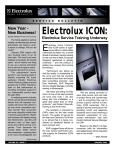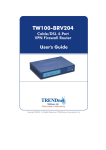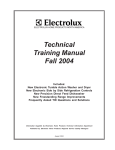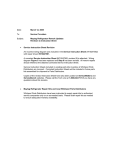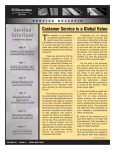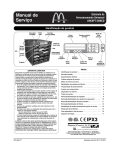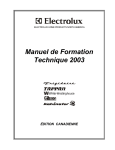Download Revised Feb 04 Svc Bulletin.qxd
Transcript
P R O D U C T S S E R V I C E EHP to Produce Select CrosleyBrand Appliances E lectrolux Home Products was recently awarded a contract to begin production of select Crosley Brand appliances this year. The model chart below indicates the model numbers and product types that EHP will produce - and that servicers will see in the marketplace in the near future. Service claims for these products are to be submitted to ServiceBench in the same manner that existing claims are submitted for other EHP repairwork. "EHP is proud to be a supplier of Crosley branded products," said John Carroll, EHP's National Service Manager. "We are equally proud to have our authorized servicer network available to assist consumers who may call upon someone to provide service." Crosley Model No. Product Type CRTE151AW Refrigerator CRTE151AQ Refrigerator CRTE171AW Refrigerator CRTE171AQ Refrigerator CRTE183AW Refrigerator CRTE183AQ Refrigerator CRTE187AS Refrigerator CRTE187AK Refrigerator CRTEICE Icemaker CDBE241AW Dishwasher CDBE241AB Dishwasher CDBE241AQ Dishwasher CDBE566AW Dishwasher CDBE566AB Dishwasher CDBE566AQ Dishwasher CDBE566AS Dishwasher VOLUME 24 / ISSUE 2 B U L L E T I N Fallingwater Cycla-matic ® R E P O R T A complete diagnosis has now been run on the Frigidaire Cycla-matic refrigerator that famed architect Frank Lloyd Wright specified for the unique home Fallingwater. Designed in 1939 for Pittsburgh business magnate Edgar Kaufman, the home named is now a museum visited by more than 140,000 people each year near Mill Run, PA. Ed Ebersole, of Ebersole Appliance in Elizabethtown, Pa., took delivery of the Cycla-matic CT150 over a month ago and began the painstaking process of determining exactly what would be needed to repair the 1950’s era refrigerator. “The most obvious defects were cosmetic, the left handle of the unit is missing, there is damage to the escutcheon plates, and the paint finish needs restoration. Trays and their covers are also missing from inside the refrigerator and three of the four shelves were broken,” Ebersole said. Ed next worked through the mechanical system. The main issue here is the refrigeration system, which is not working. It was evident that there was a leak in the sealed system, and Ed was able to narrow this down to a leak in the food plate located in the refrigerator section of the unit. Ed Young, EHP’s most experienced engineer for historic Frigidaire units, discussed the problem with Ebersole. “There is a dual system that uses a plate in the freezer section and runs to a plate that chills the refrigerator section. Both these plates are made of aluminum – and that’s the problem,” Young said. “At some time in the past the unit was periodically switched off – perhaps when the Kaufmans closed the house up for the winter.” Photo courtesy of the Western Pennsylvania Conservancy H O M E “The plates were probably not wiped dry when they defrosted – and over time that moisture would have corroded the surfaces of the plates. We know the food plate has developed one leak because of this; and if we fix this, there’s no guarantee we won’t immediately develop another. The only answer is to replace the food plate and this is not an item we are going to find that easily.” EHP will search for a food plate for a 1952 Cycla-matic CTI-150*. In the meantime the missing cosmetic parts will be specially fabricated and the painted surface will be re-finished in time for the unit to be back on display in Fallingwater, by late March. - Mark Newell *If you have any working parts for this unit, please contact the author at 706.651.7116 or via email at [email protected] FEBRUARY 2004 Electrolux‘Precision Wash’ “One of the Best Kept Secrets in Dishwashing” Originated in Europe and adapted in North America, Frigidaire’s patented ‘Precision Wash System’ from Electrolux Home ProductsNA, makes for one of the most energy-efficient dishwashers on the market today. Here’s a look at why this system works so well. I n 1994, Zanussi-branded dishwashers employed a unique wash system which utilized twin spray arms that offered the benefits of reduced noise and water consumption. At that time, EHP North America's development engineers recognized this system as one that would meet the demands of the North American market. They adapted the system by enlarging the tub capacity and tweaking wash and water systems to meet minimum energy use requirements, and in 1996 launched the Precision Wash System: the Energy Star-compliant system that today can be found in most models of Electrolux Frigidaire brand dishwashers in North America. Alternating spray arms The key to the Precision Wash design is the unique alternating spray arms and precise combinations of heat, water, detergent, and time. The current dishwasher wash system employed by the appliance industry blasts the dishes using two simultaneous high-pressure spray arms, drains the dishwasher, fills it back up and blasts some more until the dishes are clean. This high-pressure method can be noisy, wasteful, and allow food to redeposit onto dishes. cycle, compared to up to 2 gallons per fill, or 10 gallons total, in a conventional system. 100% water filtration The Precision Wash System also saves water by collecting, filtering and reusing 100% of the wash water during the wash cycle. Most systems filter wash water to some extent, but because high-pressure systems use high volumes of water, their filters are unable to remove all of the food particles. The unfiltered food is continuously re-circulated, creating a type of “soup,” which is not a desirable cleaning medium. 90 seconds. This allows the detergent to work to soften the food particles, making it easier for the water to remove them during the next 90second segment. With only one wash arm energized at a time, less water is used and less washing noise is created. The system uses only 1.2 gallons of water per fill, for a total of 6 gallons per normal wash The Precision Wash System employs two spray arms that alternate, spraying a mixture of detergent and water from the lower spray arm and then the upper spray arm every PAGE 2 The Precision Wash System has a full-size filter with thousands of tiny holes that can trap even the smallest food particles. With the low-pressure, alternating arms, the wash water has enough time to pass through the filter before being redistributed by the pump. Special spray jets on the bottom of the lower wash arm continuously clean the surface area of the filter, ensuring complete filtration. Finally, the system employs a Smart Soil Sensor, which checks the amount of food soil in the water. The sensor adjusts the wash cycle as needed to guarantee clean dishes every time. Keeps on saving FEBRUARY 2004 SERVICE BULLETIN continued on page 11 VOLUME 24, ISSUE 2 ANNOUNCEMENTS Stacking Kit for new Frigidaire Washer / Dryer Set Frigidaire has introduced a new electronic washer, GLTF2070CS0 and electric dryer GLEQ942CS0. These models DO NOT require an under counter top panel kit. Minimum under counter height is 35¼ inches. To stack the new electronic dryer or any stackable dryer with a blade lint filter on the new electronic washer, order stacking kit 134258400. This kit is non-interchangeable with stacking kit 5303937141. — by John Carroll, EHP National Service Manager N stacking kit part number 134258400 Kenmore Chest Freezer - Sears Model No.13051 The enclosed literature for chest freezers with serial numbers WB32227332 through WB32227491 reads ‘for revision 0’. This is incorrect and should read ‘for revision 1’ instead. Corrections to the part list are as follows: Part Description Compressor (EGU80HLCW)* Compressor controller Run capacitor Correct Part Number 216784600 216649315 218909913 *R134A charge for this compressor is 312 grams (10.9oz) The serial plate is incorrect. 2004 VOLUME 24 RUNNING INDEX G E N E R A L I N F O R M AT I O N ISSUE / PAGE Phone Numbers Listing of Electrolux Phone and Fax Numbers Web Sites Web Sites for Service information and feedback 1/2 3/10 Announcements 2003 Service Manuals Available! Stacking kit for new Frigidaire Washer / Dryer set Kenmore Chest Freezer Literature - correction - 1 2 2 2 3 3 1/2 3/10 SERVICE SOLUTIONS Dishwashers Dishwasher Timer - Stalling in the Cycle 2 9 Freezers Finish Flaking From Rust on Freezer Tubing Upright Freezer ‘Basket Track Kit’ Manual Defrost Upright Freezer Tubing External Condenser Kits Upright Freezers with Basket Slides Broken Shelf Support Stud on Upright Freezers Determining the Difference Between ADC Kits 1 1 1 1 2 2 2 4 4 5 6 6 6 6 Range Products Self-Cleaning Oven Doors: ‘Lock at Random’ Hot Surface Indicator Lights 2 2 4 5 Refrigerators Frost Build-up on the Evaporator New Ice & Water Dispenser Switch In-Line Regulator Fix for Front Water Filters Water Dispenser on Side-By-Side Refrigerators Icemaker Fill Tube Change New Evaporator Fan Motor 1 1 2 2 2 2 7 7 7 7 8 8 Top Load & Laundry Center Washer Mandate! Fault Codes for New Look Washer & Dryer 1 1 8 9-11 Wet Products VOLUME 24, ISSUE 2 Continued Service, Continued Growth! FEBRUARY 2004 SERVICE BULLETIN ew business growth expectations for Electrolux Home Products remains high for 2004. Last year, EHP produced one out of every four ‘white goods’ products sold in North America alone. EHP’s continued success lies in part with the level of service we provide to our consumers. The EHP Authorized Servicer Network plays a large role in this. Their continued commitment to excellence has led to an ever growing EHP consumer base. In past columns I have spoken about the expectations consumers have today and the practical steps you can take to meet and exceed their expectations. You have seen the pressures and demands are not just limited to the appliance industry, but all industries where service is required after the sale. Therefore we are challenged to keep consumers confident that they have made a smart choice and a good decision by choosing EHP. You will read in this month’s Service Bulletin about select products produced by EHP for the Crosley Corporation. These products are ones you can service by using the same parts our Authorized Part Distributors currently have in stock. Only those products produced by EHP are eligible to be serviced under the standard warranty terms of our agreement with the EHP Authorized Network. This is just one example where being a valued member of the EHP Authorized Service Company is positioning your business for future growth. Recognizing opportunity is the key to continued success. Together, we can build a progressive and successful relationship that will last far into the future. PAGE 3 SERVICE SOLUTIONS Self-Cleaning Oven Doors: ‘Lock at Random’ Problem: Oven door locks at random. This may occur during bake cycle or even when the range is not in use. Failure is often very intermittent and usually does not occur when the service technician is present making an accurate diagnosis very difficult. Often the EOC and sensor are replaced unnecessarily. Cause: There are three possible causes for this; 1. A defective EOC. 2. A defective switch on the door latch/motor assembly. (or) 3. An internal short in the oven door light switch. Solution: 1. Defective EOC. The software in the EOC could erroneously be initiating a locking sequence without the clean function being selected. Also the contacts in the latching relay on the EOC can short circuit or stick in the closed position. This is the least likely cause of the problem. 2. Defective switches on door latch/motor assembly. This failure will only apply to ranges that have two switches in the monitor circuit of the latch motor assembly. These switches will be labeled Lock Switch A and Lock Switch B on the wiring diagram. On the lock motor assembly switch A is the lower switch and switch B is the upper switch. The EOC constantly monitors the condition (open or closed) of the microswitches and if the switch contacts fail either open when they should be closed or vice versa, then the EOC will run the lock motor to try to correct the condition. This will sometimes also result in a fault code displayed on the EOC. 3. Internal short in oven door light switch. This is the most frequent cause of the intermittent nuisance locking of the oven door. On many models the oven light switch has two independent electrical circuits. One set of contacts serves as an interrupt circuit to the latch motor to prevent the motor from running if the door is open. The other set of contacts supplies line voltage to the oven lamp or oven lamp relay when the door is open. There is a specific type of short circuit that can occur inside the body of the switch which allows the voltage that would normally be supplied to the oven light circuit to bleed through to the latch motor contacts and cause the motor to run. This failure is difficult to diagnose unless you are present at the time of failure. There is one technique that can be used to achieve an accurate diagnosis when this failure is suspected. Locate the wire on the E4 or MDL terminal of the EOC this is usually a pink wire that comes from the oven door light switch. Disconnect the wire and insulate the terminal with electrical tape. Secure the wire so that it can not touch any other electrical components or short to ground. With this wire disconnected and secured allow the customer to continue using the range to see if the nuisance locking occurs again. If it does then there is no doubt that the cause is an internal short in the body of the oven door light switch. continued on next page PAGE 4 FEBRUARY 2004 SERVICE BULLETIN VOLUME 24, ISSUE 2 SERVICE SOLUTIONS Self-Cleaning Oven Doors: ‘Lock at Random’ -cont’d Below is pictured a typical circuit in which this kind of failure can occur. You can see that L1 is present at the lower left corner of the door switch common terminal. If the internal short occurs, L1 voltage is delivered to the normally open contact pictured at the top right corner of the door switch diagram. This will cause the latch motor to run. Hot Surface Indicator Lights Problem: When you receive a complaint from a customer that the hot surface indicator lamp on their smooth glass top range stays on after the cooktop has cooled down, you can be certain that the problem is NOT in the surface element switch. Solution: The hot surface indicator light operates on an independent circuit that is not connected to the element control switch. There is a separate set of contacts in the limiter on every element that are used to turn the light on or off as required. The terminals for these contacts often have one grey wire and one black wire connected to them. To diagnose the internal contacts you must disconnect the power to the range, disconnect either the grey or black wire, which ever is most convenient, and test for continuity between the terminals of the limiter contacts. If the top is cold there should be no continuity. The limiter is a non serviceable part . You must replace the entire element if the hot surface light contacts have stuck closed. VOLUME 24, ISSUE 2 FEBRUARY 2004 SERVICE BULLETIN PAGE 5 SERVICE SOLUTIONS Upright Freezers with Basket Slides Problem: Baskets fall off basket slides in upright freezers. Cause: Too much weight in the basket. Solution: Install basket slide shim kit - Part Number 216950200. Kit consists of the following: (2) shims, (6) screws, and the instruction sheet. To install: 1. Remove the basket or baskets from the freezer to allow clearance to install shim. 2. Remove basket slide. Secure basket shim and basket track to freezer wall with the screws provided in the kit. 3. Place basket or baskets on track and test. Broken Shelf Support Stud on Upright Freezers Problem: Upright Manual Freezers with Broken Shelf Support Stud. Cause: Too much weight on shelf. Solution: Order shelf stud repair kit - Part Number 216950400. Kit consists of (1) shelf support right hand, (1) shelf support left hand, (1) reinforcement plate, (2) screws, and an instruction sheet. Determining the Difference Between ADC Kits Problem: Servicer confusion over two new ADC kits with different part numbers. Cause: Each ADC kit is for a unique application. Solution: Find the voltage rating on the refrigerator in question. Order the correct kit based on your findings. The ADC II kit for 220 Volt 50-60 HZ refrigerators is part number 5303918305. The ADC II kit for 115 Volt 60 HZ refrigerators is part number PAGE 6 FEBRUARY 2004 SERVICE BULLETIN VOLUME 24, ISSUE 2 SERVICE SOLUTIONS In-Line Regulator Fix for Front Water Filters Problem: Repeated leaking of front water filter. Cause: High water pressure. Solution: We have found through testing, that water pressure in the 90 PSI and higher range has caused repeated leaking of front water filters. The filter and its base can be replaced and properly adjusted, however, after 4 to 6 months the filter starts to leak again. There is now a in-line regulator that can be installed on the inlet side of the water filter. (See Picture) The part number for the regulator is 241556001. The regulator will hold the pressure on the filter and water system at 60 to 65 PSI with up to 150 PSI line pressure. To install: 1. Remove the cover from the water lines going to the front filter. 2. Remove the inlet water line (Brown line on right hand side) 3. Push the water pressure regulator into the filter base inlet. 4. Reinstall the water line and cover. The regulator needs to be installed on the inlet side of the water filter as shown. Water Dispenser on Side-by-Side Refrigerators Problem: Dispenser does not operate unless you push in on the door switch on side by side refrigerators with the two paddle dispenser. Cause: The freezer door liner is shifted toward the mullion or the freezer liner is slightly wider than it should be in the front. Solution: There is a service freezer light switch available with a longer actuator, that will allow the contact set to close and complete the connection to the dispenser. The part number for the switch is 241547901. VOLUME 24, ISSUE 2 FEBRUARY 2004 SERVICE BULLETIN PAGE 7 SERVICE SOLUTIONS Icemaker Fill Tube Change Problem: Water is running over the ice maker fill tube on side by side and top mount freezer refrigerators. This causes ice to build up on evaporator fan motors and along the right side of evaporators. Cause: In some cases, water entering the refrigerator at 75 PSI and higher will follow along the top of the fill tube. A small amount of water will then spray out of the fill tube and run down the liner behind the evaporator cover. Solution: The fill tube has been changed. The open top is now shorter and comes back to a "V". This change is in addition to the change called out in the May 2001service bulletin on page 10. The two changes are giving us much better control of the water coming out of the fill tube and still allowing for the open top to dry the fill tube to prevent freezing. The part number of the new fill tube is 241523501. New Evaporator Fan Motor Problem: Change to evaporator fan motor (part number 240563701). Cause: Part availability and suppy issues. Solution: The fan motor will change in service parts from part number 240563701 to service kit number 5303918304. The new kit will have a standard evaporator fan motor, a new rear fan motor mounting bracket and a new wiring harness to connect the motor. original fan motor new fan motor PAGE 8 FEBRUARY 2004 SERVICE BULLETIN VOLUME 24, ISSUE 2 SERVICE SOLUTIONS Dishwasher Timer - Stalling in the Cycle Problem: Mechanical dishwasher timers stalling or just not completing the cycle. After talking with Servicers on the phone, a number of timers have been changed just to have the customer call back to say it is still not working. To assist in finding the cause for this problem, here is a procedure you can follow that can help find the cause for this complaint. Solution: Before you make the trip to the customer’s home, it would be a good idea to call them by phone and have them start the dishwasher for you, so it can be getting hot while you are on the way to the house. It will not be necessary to have the dishwasher loaded with dishes or detergent on this call. The dishwasher needs to run for about 25 minutes. This will aid you in checking this problem. When you first arrive, determine from the customer what cycle and options were set at the time of failure. You will also need to know what position the timer was in when it stalled and how long the timer stayed at that location. Next check the water temperature at the sink. This way you will know how hot the water was when the customer started the dishwasher for you. With this information it is time to check the dishwasher. First to be checked is the heater and safety thermostat; both of these are located and checked from underneath. They are on the bottom left side of the tub. Check the heater for continuity. You will, or should, get a resistance reading on the heater. The safety thermostat should just read closed. Next, reset the controls and reposition the timer to just before the location the customer found the timer when it had stalled. After setting the timer and the option switch, make sure power is going to the heater to heat the Thermostat Name Temp Assure Temp boost Sanitize High Temp Wash VOLUME 24, ISSUE 2 Part number 154227805 154227806 154227807 154227808 Setting 117° ± 5.5° 127° ± 5.5° 137° ± 5.5° 122° ± 5.5° water. Once this all has been done, check the temperature of the water in the tub. The timer should advance on into the stall. You now need to wait until the temperature rises in the tub to close the control thermostat. The control thermostat is located under the tub to the right side behind the junction box. Shown below is a chart that lists the different control thermostats currently used on dishwashers. This chart shows the temperature settings of the different thermostats as well as the temperature of the water in the tub. Water is heated in the dishwasher by falling back onto the heater as it is being sprayed inside the tub. The temperature of the water will raise about one degree every four minutes. As the water falls back onto the heater, then onto the tub, the thermostat senses this change in temperature. If you can watch the water temperature without opening the door you can follow this temperature rise. Once the water temperature has reached the proper temperature the control thermostat should close to advance the timer. If the thermostat does not close, take a jumper wire and carefully short across the control thermostat to see if the timer then advances. If the timer only advances after shorting across the control thermostat, replace this thermostat. If you replace the control thermostat you should add thermo mastic to the head of the new part before installing into tub. This will give you a better contact between the thermostat and the tub. When mounting the new thermostat into the tub, make sure it is good and tight in the mounting hole. If the timer does not advance after the thermostat is shorted out, check the wires from the thermostat to the selector switch; then on to the timer to make sure you have all good tight connections. The control thermostat only controls the timer motor in Tub Temperature the delay cycle; a loose con127° ± 5° nection can keep the timer from 137° ± 5° advancing. 147° ± 5° 132° ± 5° FEBRUARY 2004 SERVICE BULLETIN PAGE 9 ELECTROLUX PHONE NUMBERS Name Reason For Call Phone Number Fax Number Customer Care Center Any Consumer Issue 706-860-4110 706-651-7135 Credit Department Balance on Account Need Invoice 614-825-0849 614-781-9312 Damage Claim Center Return Authorization Damage Claims Damage Allowances 800-456-4669 (Option 1) 706-651-7715 Dealer / Distributor Allowances 800-456-4669 (Option 2) 706-651-7054 National Locator Parts, Service, Dealer, Manuals 800-444-4944 Parts Department Parts Questions 800-599-7569 (Option 2) 706-869-9096 706-228-4598 Product Specialist (DDPS) Product Exchange 800-456-4669 (Option 2) 706-651-7135 Servicer Assistance Center (SAC) Wiring Diagram Technical Feedback Territory Manager Pay Increase Technical Specifications Service Contract NOTE: This information is also available by logging onto ServiceBench.com or Frigidaire.com Contact Status Number Type Model/Serial Number Expiration Date Full Coverage Deductible Warranty NOTE: This information is also available by logging onto ServiceBench.com PAGE 10 888-842-3660 option 1 warranty administration option 2 for refrigerators, freezers, air conditioners or dehumidifiers option 3 for cooking option 4 for laundry or dishwashers 888-842-3660 (Option 1) 706-651-7735 888-842-3660 (Option 1) 706-651-7735 FEBRUARY 2004 SERVICE BULLETIN VOLUME 24, ISSUE 2 Precision Wash System cont’d Additional unique features help to make this one of the quietest and most energy-efficient dishwashers on the market. One pump and motor (both smaller than industry standards) are used for washing purposes and another (even smaller set) for draining the tub. Since only one wash arm at a time is energized, a smaller, more efficient motor and pump is utilized. This system lowers motor and splash noise, and reduces energy consumption. The one- piece door design eliminates the gap between the door and access panel found on many competitive models, thus improving the aesthetics and lowering operational noise levels even more. Burner Box, Cooktop, EOC & Switch Access Diagram Refer to the steps listed here when servicing all 2004 Frigidaire slide-in and drop-in gas ranges 1. 2. 3. 4. 5. 6. 7. 8. 9. 10. 11. 12. 13. 14. 15. 16. Shut off gas to range. Disconnect power. Remove gas supply line at the regulator. If necessary, carefully move range out of the cabinet opening. Remove grates and burner caps. Inspect burners. Remove screws securing burner skirts. Inspect the electrode for cleanliness, etc. Note: The electrode cannot be removed from orifice holder assembly. Remove knobs. Remove flange nut. Remove control panel. Remove switch mounting plate screws. Remove 2 screws from front shield on each side panel. Remove 5 screws from front shield and 4 screws from vent trim to be able to remove console. Remove machine screw on manifold side range securing manifold to cooktop. Remove cooktop assembly from unit. Remove screws all around mounting plate element located under cooktop assembly. Remove glass assembly from burner box. To reassemble cooktop, reverse procedures. Ef fective March 1st 2004 All warranty claims must be submitted no later than 60 days* after completion of service. *Claims not submitted within this time frame will be rejected. If you have any questions please contact the Service Assistance Center at 888-842-3660 Option 1. VOLUME 24, ISSUE 2 FEBRUARY 2004 SERVICE BULLETIN PAGE 11












